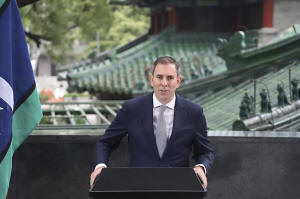Australian treasurer, visiting Beijing, welcomes Chinese efforts to
stimulate its economy
 Send a link to a friend
Send a link to a friend
 [September 27, 2024] By
EMILY WANG FUJIYAMA and ROD McGUIRK [September 27, 2024] By
EMILY WANG FUJIYAMA and ROD McGUIRK
BEIJING (AP) — Australian Treasurer Jim Chalmers on Friday welcomed
Chinese efforts to stimulate its slowing economy, noting that its recent
weakness has hurt Australia.
Chalmers was wrapping up a two-day visit to Beijing, the first to China
by an Australian treasurer in seven years, as strained bilateral
relations mend.
He told reporters that Australia’s economy was slowing because of global
economic uncertainty, high interest rates and China’s slowdown.
“Those three things are combining to slow our own economy considerably
and when steps are taken here to boost economic activity and to boost
growth in the Chinese economy, subject to the details that will be
released in good time, we see that as a very, very good development for
Australia,” Chalmers said.
China is the biggest buyer of Australia’s most lucrative exports: iron
ore and coal.
“Our resilience and prosperity are closely connected to China’s economy
and the global economy,” Chalmers wrote in an opinion piece published
Friday in The Australian newspaper. He noted that his department
forecasts Chinese annual economic growth at below 5% for the next three
years, the weakest expansion since the late 1970s.
While in Beijing the two sides held meetings for the Australia-China
Strategic Economic Dialogue, reviving the once annual talks aimed at
growing trade and investment after a seven-year hiatus.

In 2020, China introduced a series of official and unofficial trade bans
on Australian commodities, including coal, that cost Australian
exporters more than 20 billion Australian dollars ($14 billion) a year.
Such “trade impediments” now cost Australian exporters less than AU$1
billion ($690 million) a year, Chalmers says.
At the outset of Thursday's meetings, Zheng Shanjie, chair of China’s
National Development and Reform Commission, noted how relations had
improved since Chalmers’ center-left Labor Party government was elected
in 2020, ending nine years of conservative rule in Australia.
“Our development represents opportunities rather than challenges with
each other,” Zheng said through an interpreter.
“At a time when the international situation is intricate and turbulent,
it is of great significance for both countries to discuss economic
development and cooperation opportunities together,” Zheng added.
Two-way bilateral trade reached a record AU$327 billion ($225 billion)
last year, more than double its value when a free trade deal was struck
in 2015.
During his visit, Chalmers was expected to raise with the Chinese
restrictions on imports of Australian lobsters and red meat from two
Australian processors.
Chalmers confirmed he had raised the lobster trade in discussions and
said Australia was seeking a “speedy resolution of the restrictions.” He
blamed “technical issues” between bureaucracies of the two nations for
the delay.
[to top of second column] |

In this photo released by Australian Treasury, Australia's Federal
Treasurer Jim Chalmers speaks during a press conference in Beijing
Friday, Sept. 27, 2024. (Australian Treasury via AP)
 China raised concerns about
Australian foreign investment rules.
Chalmers said he had explained to Zheng that Australia's regulations
did not target China and had agreed to further discuss the
restrictions.
“Ours is a non-discriminatory regime which is about managing risks
in foreign investment,” Chalmers said.
“Rejecting proposals is a very rare thing and it isn't just
(proposals) from one country,” Chalmers added.
China wants to invest in Australian critical minerals, but Australia
shares U.S. concerns over China’s global dominance in critical
minerals and control over supply chains in the renewable energy
sector.
Citing Australia’s national interests, in June Chalmers ordered five
Chinese-linked companies to divest their shares in the rare earth
mining company Northern Minerals.
China has been grappling with a lagging economy post-COVID, with
weak consumer demand, persistent deflationary pressures and a
contraction in factory activity.
Earlier this week, China announced a series of new measures to boost
the economy and revive its ailing property sector. The central bank
lowered bank reserve requirements by 0.5% as of Friday. It also has
slashed interest rates on its loans to commercial banks and lowered
the minimum down payments for some mortgages.
Unconfirmed reports Thursday by the South China Morning Post and
Bloomberg said the government plans to spend about 1 trillion yuan
($142 billion) on recapitalizing six big state-owned banks.
While China is growing economically closer to Australia, Beijing is
becoming militarily more belligerent in the Asia-Paficic region.
On security issues, Chalmers said he raised in his discussions a
Chinese aircraft carrier accompanied by two destroyers entering an
area near Japan’s shores for the first time last week.
He also raised international concerns over China test-firing an
intercontinental ballistic missile into the Pacific Ocean this week.
“I was able to reiterate in the meetings yesterday afternoon our
expectations of safe and professional conduct of all militaries
operating in our region,” Chalmers said.
“But as you would expect, the overwhelming focus of our discussions
here have been the economy,” he added.
___
McGuirk contributed from Melbourne, Australia.
All contents © copyright 2024 Associated Press. All rights reserved
 |